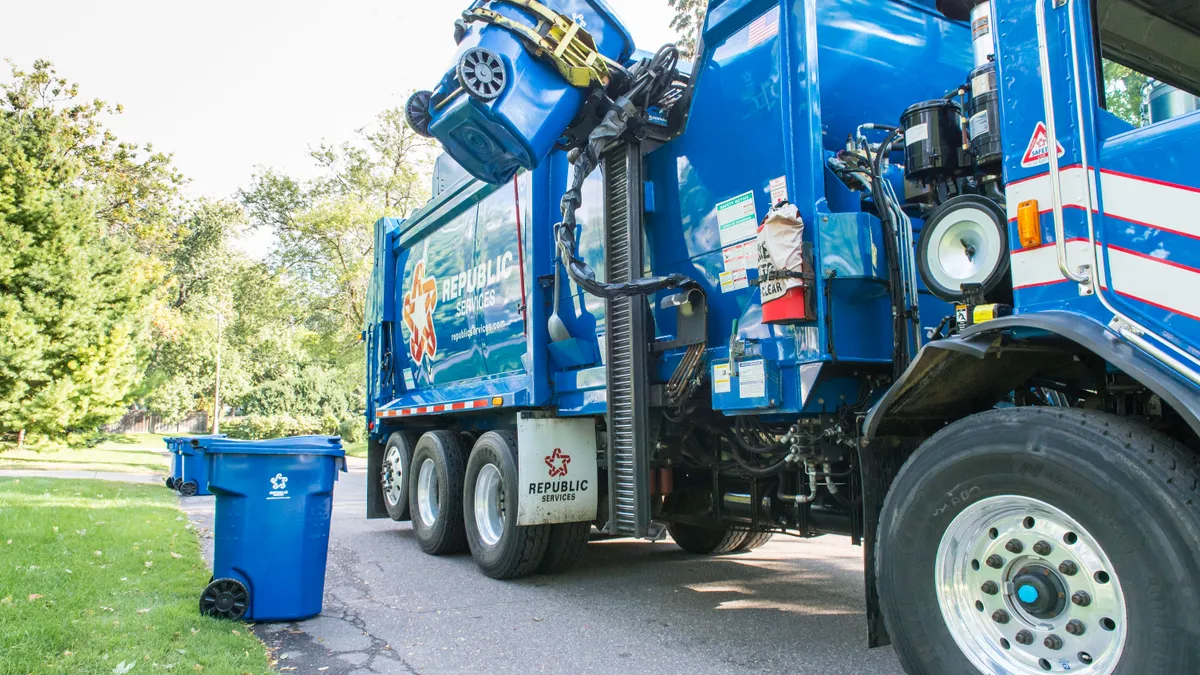2019 Earnings
| Revenue | $10.299B |
| YoY Change | 2.57%▲ |
| Net Income | $1.073B |
Q4 Earnings
| Revenue | $2.576B |
| Net Income | $289.3M |
Republic Services reported positive 2019 earnings as multi-year plans continue to pay off and operational efficiencies kick in. Adjusted free cash flow came in above guidance at $1.2 billion, boosted by a core price increase of 4.8% and MSW landfill pricing consistently above 3%.
The company is expecting average yield to be 3% or better for 2020, which President Jon Vander Ark said in an earnings call he believes is sustainable because "it's years in the making" due to new contract pricing structures. On the collection and disposal side, Republic saw a $120 million boost from converting 31% of its contracts to a more favorable price increase index. Further gains are now expected on the recycling side as similar plans come to fruition.
Recycling reset continues
- Like the broader industry, Republic's recycling business has been greatly affected by commodity market challenges. Recycling revenue was $273.2 million for the year (down from $298 million in 2018 and $539 million in 2017) and commodity values are expected to stay flat throughout 2020.
- Executives were optimistic they may have finally turned a corner, due to a "momentum shift" in ongoing contract negotiation efforts. Republic has now repriced about 36% of all municipal recycling collection contracts, as well as 55% of overall contracted MRF processing volumes.
- Executives now believe they could even see recycling revenue improve this year beyond a projected $15 million EBITDA headwind. "The actions that we already have baked into the plan more than offset that. To the extent we make additional progress, that's just icing on top of that cake," said CFO Chuck Serianni.
Republic is far from alone in its push to reset recycling contracts to cover service costs regardless of commodity values, but the company is among the most active in trying to shape this public narrative. Company executives have been working this new message into conferences and media appearances for years; Vander Ark spoke at last fall's WASTECON about the need for "structural change" and leadership maintains it is committed to growing the recycling business long-term.
While plenty of local governments have at first been unwilling or unable to absorb these price shifts, it appears Republic is beginning to win out via attrition or consensus. At this time last year, only about 20% of municipal costs had been repriced and executives were reporting more resistance. Now, according to Vander Ark, more municipal staff members are working with them to sway elected officials.
In a rosy spin on such negotiations, he described arrangements where cities can still benefit from commodity value. "And when the buy prices are high," he argued, "that creates some upside to get the new fire truck, put in the new playground and do things to enhance the community."
As Republic touts its desire to increase recycling volumes as part of 2030 sustainability targets, the company still caveats that any environmental decision must still be weighed against economic factors. It's common to see this refrain used to rationalize dropping certain materials after negotiations, especially glass.
"We've got to have those honest discussions with generators about whether the material really does have real sustainable environmental value at the end of the day, or are we just basically burning more rubber and more fuel to make ourselves feel good," said CEO Don Slager.
2019 developments
- After Republic's landfill costs rose in the past, they've begun to level out due to what it described as a more diligent approach to maintenance. "We're getting in quickly and we're mitigating small problems, so that those small problems won't become big ones. And that's really helped us mitigate our cost over time," said Vander Ark.
- E&P revenue (categorized as environmental services) came in at $191.8 million, down from 2018 as overall rig count continues to decline. According to Vander Ark, "we're now taking a more conservative view regarding drilling activity and are assuming it will remain lower for longer."
- Republic reported spending $526 million on acquisitions during 2019 ($463 million net of divestitures), estimated to be worth $181 million in annual revenue. Slager said the company will continue to "pay more for businesses with good infrastructure and "critical permits, that are impossible to replicate" – a description that fits a recently acquired C&D processing and rail transfer facility in Massachusetts.
Looking ahead
- Republic is projecting revenue growth of 4.5-5% for 2020, largely driven by anticipation of a 3% average yield and 1% benefit from acquisitions. After paying out $491.2 million in dividends last year, and repurchasing $399.4 million worth of shares, the company plans to do more in 2020. That could include approximately $525 million in dividends and $400 million worth of share repurchases.
- In a smaller, but notable investment the company will also spend $120 millon on a solar investments at closed landfills. This builds on past projects at Republic sites and will take advantage of a tax credit set to expire this year.
- Republic anticipates spending around $200 million on tuck-in acquisitions during 2020, with Slager describing options as "the most robust pipeline, we've seen in years." Executives were asked whether that might include potential Advanced Disposal divestitures, as part of a broader question, but did not specify.














